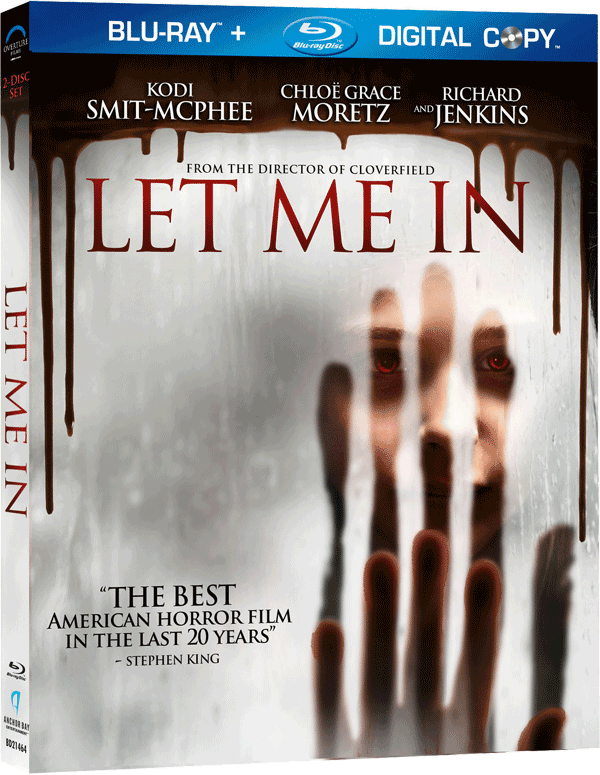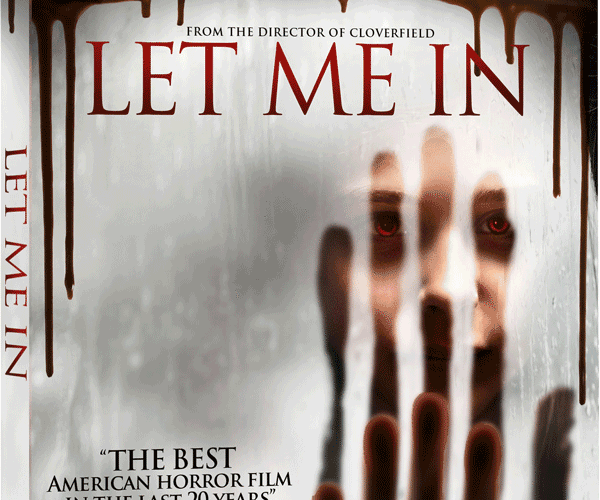
Anyone who goes into Let Me In having seen Let the Right One In will be hard-pressed not to make comparisons, and that’s more than fair. Let Me In, directed by Matt Reeves, is so similar to Tomas Alfredson‘s original adaptation that it’s nearly impossible not to play the compare game. It’s not a shot-by-shot remake by any means, although some imply different.
That said, on its own merit, this is an excellent re-adaptation. Reeves’ followup to Cloverfield is a huge leap forward, both thematically and emotionally. Cloverfield was terrific fun, but doesn’t compare to Let Me In‘s level of emotional investment. Here, one cares completely for the two leads.
Reeves doesn’t pull his punches, especially when it comes to the relationship between Owen (Kodi Smit-McPhee) and Abby (Chloe Moretz). There’s something wrong with Owen – undeniably. But it doesn’t come off unbelievable. Smit-McPhee perfectly sells Owen, and his perversions, well. This is a boy with uninvolved parents, no friends and the only other kids you see him interact with are vicious bullies, who would give the psychopathic Kung Fu kids from The Karate Kid a run for their money.
When he falls in love with the vampire Abby, it makes sense. Abby and Owen don’t feel different at all, outside of Abby being ageless and a vampire, of course. They’re both full of loneliness and harbor rage and violence, but Abby expresses that violence. Reeves goes far to convey the dark side of these kids. They can be cruel, and Reeves takes that to the next level without ever getting mean or judgmental.
Speaking of villains, there are none here to speak of. There’s no clear antagonist and Reeves never paints in broad strokes. If anyone has true evil in them here, it’s Abby and Owen. Abby shows practically no remorse in her bloodshed and Owen condones it out of love, which makes for a heartbreaking decision he makes towards the end. (Spoiler Alert) When you see Abby kill The Policeman (he’s never given a proper name, but is played excellently by Elias Koteas) you see the monster that she is. (Spoiler Over)
There’s a sweetness between the young couple present during their courtship, which still manages to be endearing even as more and more people die. Reeves emerges as an actor’s director. Case in point, Richard Jenkins‘ performance as The Father. Whether he offers a brief moment of happiness or a frustrated moment of anger, his childish nature is always present, adding a depth and tragedy to his character. His love for Abby is strong, as well as his disdain towards her new relationship with Owen. It’s a twisted love tale within a twisted love tale.
Where the film truly comes short is some spotty CG moments. A computer-generated Abby isn’t a tenth as interesting as the vulnerable Abby that we see interact with Owen. Whenever it gets to those attack moments, you just can’t wait to get back to Owen and Abby’s more subtle and touching moments. And shockingly, Michael Giacchino’s score is slightly uneven. Giacchino nails the character moments, but faults when it comes to tension. It becomes too bombastic where it’s almost a distraction instead of adding to the already affective and moody atmosphere.
Let Me In is a film that will find a truly appreciative audience one day. It shows that Reeves is a true talent to behold behind the camera, both visually and thematically. This re-adaptation isn’t as pointless as some were expecting it to be and as some are still, sadly, claiming it to be. With each viewing the film grows to be both richer and more beautiful. Time will surely do this could-be classic justice.

Video: The pallet of Let Me In is a dark and cold one, obviously playing into the thematics of the film. So for those of your looking for an eye-popping and colorful transfer to show off on your big screen T.V’s, this ain’t it. But for those of you with an eye that loves attention to detail, this crisp and textured aesthetic will make for a minor visual feast. All the colors, especially black and blue, are solid and. There’s no murkiness, except for perhaps a moment or two. Overall, this transfer gives the film’s tremendously bleak atmosphere the justice needed.

Audio: Sound is just as important to the mood of the film as the visuals are. Similar to the look and feel of the film, Let Me In‘s sound ranges from scenes of pleasantness or haunting silence to pure bombast. This is most noticeable whenever Michael Giacchino‘s score is present, which represents the film’s sound-design as a whole perfectly. Giacchino’s score is both subtle and overwhelming, the latter being a little too overwhelming. The score is presented wonderfully, as is the rest of the film. There’s never a false or mishandled moment. The score, the sound FX, and every little detail is crystal clear.

Special Features: First up is Matt Reeves’ audio commentary. This is a must-listen for fans. Reeves delves into every aspect of the film imaginable. No stone is left unturned. Reeves’ commentary is filled with a wild range of memorable tidbits. Next up, the deleted scenes, which also contain the option of Reeves commenting on why they were cut. They’re all impressive standalone moments worth a watch, especially a quiet and poignant exchange between Owen and Mr. Zoric (the gym coach, played by Ritchie Coster). The short making-of doc is impressive, but with such an informative commentary track, it’s almost unnecessary. And – lastly worth mentioning – a small feature on the fantastic car crash sequence. It details everything one needs to know about how the excellent scene was accomplished.



